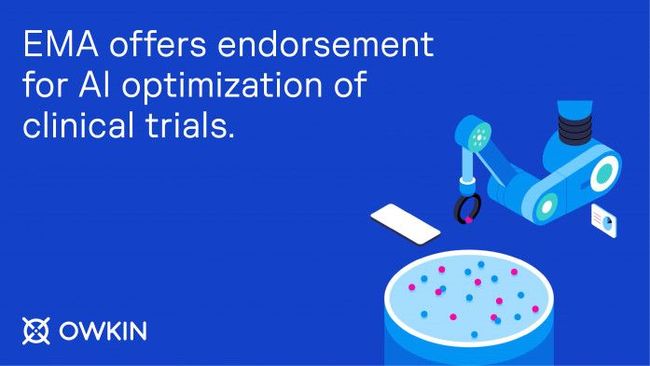
PARIS, FRANCE, May 17, 2023 – (ACN Newswire via SEAPRWire.com) – AI Biotech Owkin, a leading provider of AI-powered solutions for drug discovery and clinical development, has received a letter of support from the European Medicines Agency (EMA) regarding their proposed statistical adjustment on deep learning prognosis covariates obtained from histological slides. The proposed method uses the predictions of two deep-learning models, MesoNet and HCCnet, as prognostic biomarkers for the adjustment of efficacy analysis on the overall survival of life-prolonging drugs in randomized phase 2 and phase 3 clinical trials.
 |
MesoNet and HCCnet are proprietary deep-learning models trained using digitized pathology imaging from mesothelioma and hepatocellular carcinoma (HCC) patients to predict overall survival. The training is performed with an algorithm that uses pre-trained models to extract information from images and focuses on small regions of the biopsy that are most relevant to prediction. The models brought a significant improvement in prognostic performance for overall survival when added to currently used stratification factors.
The proposed context of use is to apply the deep-learning models’ predictions as prognostic biomarkers for the adjustment of efficacy analysis on overall survival of life-prolonging drugs in randomized phase 2/3 clinical trials. The MesoNet predictions will be used to adjust efficacy analysis on the overall survival of life-prolonging drugs in first-line malignant pleural mesothelioma patients in randomized phase 2/3 clinical trials. The HCCnet predictions will be used to adjust efficacy analysis on the overall survival of life-prolonging drugs in the adjuvant setting for resected hepatocellular carcinoma patients in randomized phase 2/3 clinical trials.
The EMA recognizes that the proposed AI models’ main proposed strength is the gain in prognostic performance compared to current practice’s covariate adjustment in clinical trial settings. The models’ interpretability features allow researchers to understand the salient features that informed the model’s prediction and avoid the drawbacks of black box AI models. However, the evidence base for the AI model approach as new technology is limited compared to traditional approaches. Therefore, Owkin is encouraged to use their approach in future trials and do additional prospective validation.
Felix Balazard, Director of Optimized Development at Owkin said: “This EMA letter of support offers a clear regulatory path for integrating AI models based on histopathology into the analysis of randomized clinical trials. Owkin is bringing AI to the regulatory setting.”
Covariate adjustment has been endorsed by regulatory agencies like the EMA and FDA, and Owkin believes that its data-driven approach to this statistical method can significantly improve the success rates of trials, including the ongoing mesothelioma and HCC trials. With Owkin’s Federated Research Network, it can develop on-demand prognostic scores for other indications, which can further reduce clinical trial failure rates.
Contact Information
Antonia Trower
VP of Marketing
antonia.trower@owkin.com
+447539359014
Copyright 2023 ACN Newswire. All rights reserved. (via SEAPRWire)
